Poverty

Working Paper 201/2025: A Glance at International Challenges of Refugee Crises in the New Millenium
Abstract:
This study investigates the intricate relationship between forced displacement and human development. By examining refugee outflows from key regions, this paper seeks to comprehend the factors driving these movements and their development implications. Employing a qualitative case study methodology, the research focuses on the five main refugee outflow countries in 2023. The paper finds that the most relevant factors that induce displacement are political violence, especially civil conflict, and climate change. Refugee emergencies have multiple aggravating elements, like economic crises, food insecurity, and infrastructure damage. Despite not identifying strong correlations between displacement and human development (measured through HDI), except for Syria, the study reveals that these emergencies are simultaneously humanitarian and developmental challenges. Repercussions are more prominent in the Global South since it is the origin and the destination of over 70% of displaced people. The findings reiterate the urgency for integrated policy responses that combine development and humanitarian efforts.
Cite this Working Paper:
Rocha, Marcela e Eduardo Moraes Sarmento (2025). “A glance at international challenges of refugee crises in the new millenium”. CEsA/CGS – Documentos de trabalho nº 201/2025
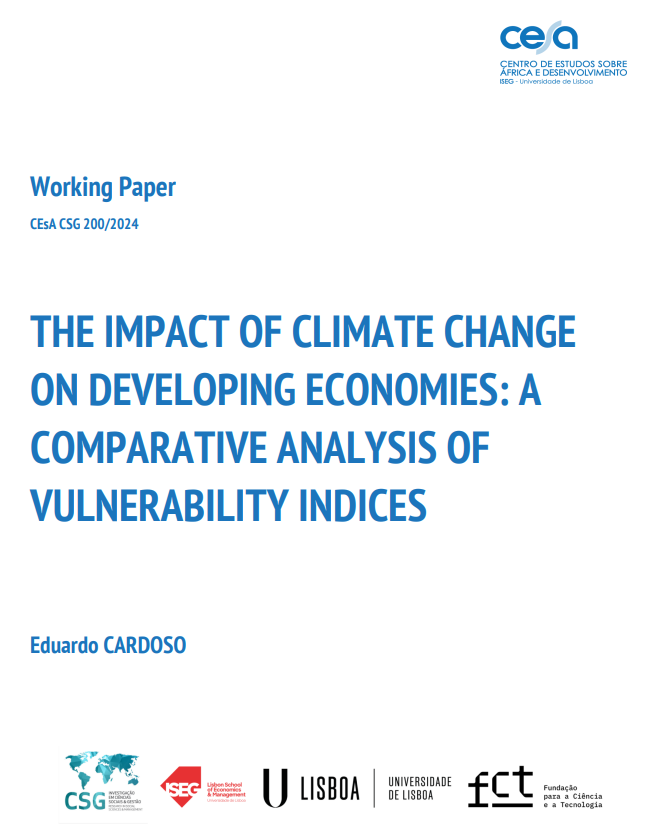
Working Paper 200/2024: The Impact of Climate Change on Developing Economies: A comparative analysis of vulnerability indices
Abstract:
In order to make informed decisions on climate finance and policies, there is an increasing need to develop an index to assess countries’ vulnerability to climate change. However, differing concepts and methodologies have led to varied views on which countries are most vulnerable and deserve more international financial support. This Working Paper examines whether key indices in climate science consistently classify countries’ vulnerability to climate disruption. It begins by reviewing literature on the impact of climate change on developing countries, followed by a comparative analysis of the EVI, ND-GAIN, INFORM, and WRI indices from 2014 to 2020. The findings indicate that while these indices are valuable for understanding and monitoring vulnerability, their differing components lead to divergent results. This research underscores the importance of a holistic approach to vulnerability assessment and calls for informed selection of indices based on specific objectives and contexts.
Cite this Working Paper:
Cardoso, Eduardo (2024). “The Impact of Climate Change on Developing Economies: A comparative analysis of vulnerability indices”. CEsA/CSG – Documentos de Trabalho nº 200/2024.
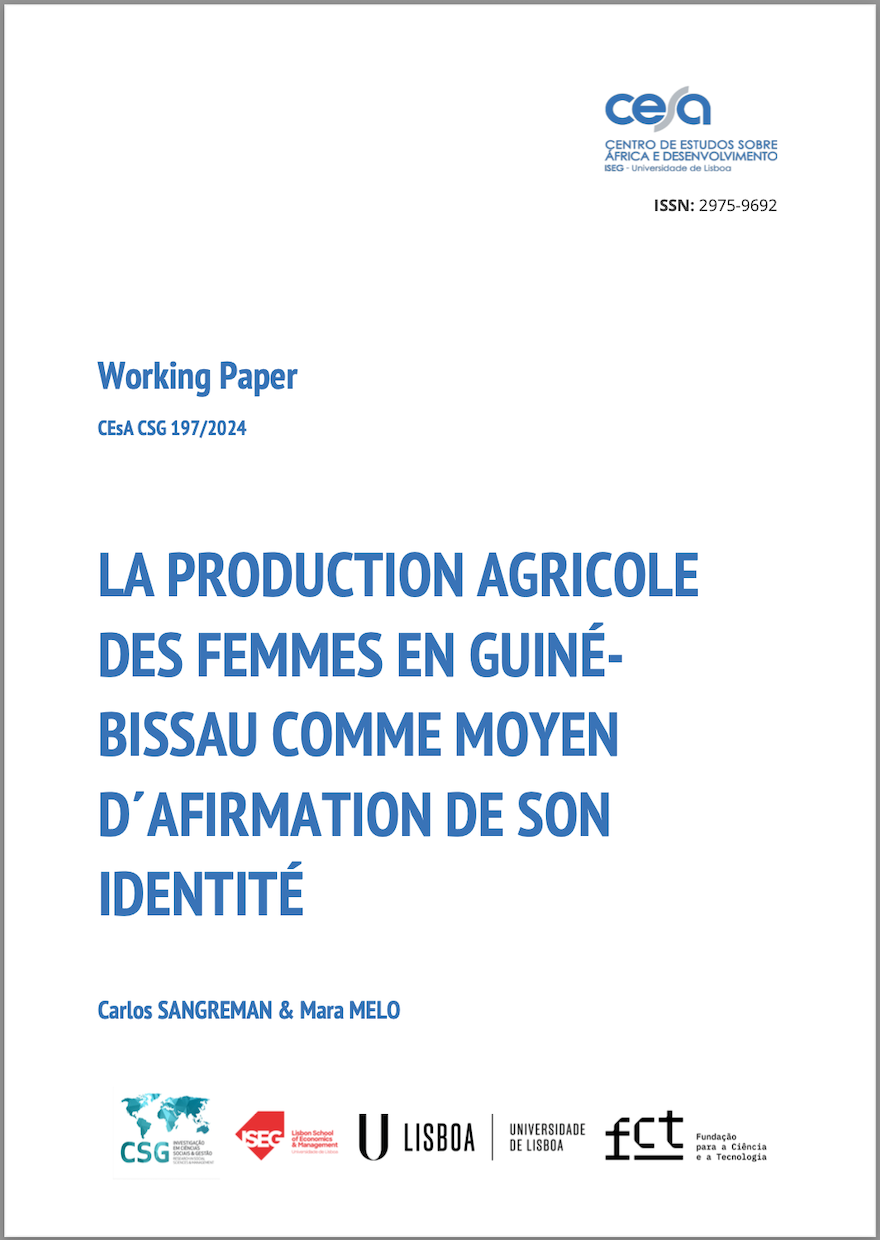
Working Paper 197/2024: La Production Agricole des Femmes en Guiné-Bissau comme Moyen d´Afirmation de son Identité
Abstract:
This working paper is an intermediate product of the study done for Swiss Cooperation in Guinea-Bissau, written in French without any point in Portuguese. What we demonstrate, as well as the principles of restitution and appropriation by the persons or institutions that access to respond to surveys or interviews, are words that do not translate into concrete actions for this Cooperation. The data were obtained by surveys and interviews in the regions of Bissau, Biombo, Bafatá, and Oio, with the producers (which also include a limited number of male producers) of leguminous agricultural products, in a sample of 160 people chosen at random. At the option of the promoter, the study focused on the marketing of products and not on production. To better understand the results, it must be said that this business model is not very profitable, but it is an activity that gives a greater independence of women in relation to men in the family space, since decisions about the use of profits belong to the producers. It also has a potential environment of action for the affirmation of the social (and not just family) identity of women that should not be despised although, as far as we can see, this is expressed for now only in the organization of associations of producers.
Cite this Working Paper:
Sangreman, C. e Melo, M. (2024). “La Production Agricole Des Femmes En Guiné-Bissau Comme Moyen D´Afirmation De Son Identité”. Instituto Superior de Economia e Gestão – CEsA/CGS – Documentos de trabalho nº 197/2024
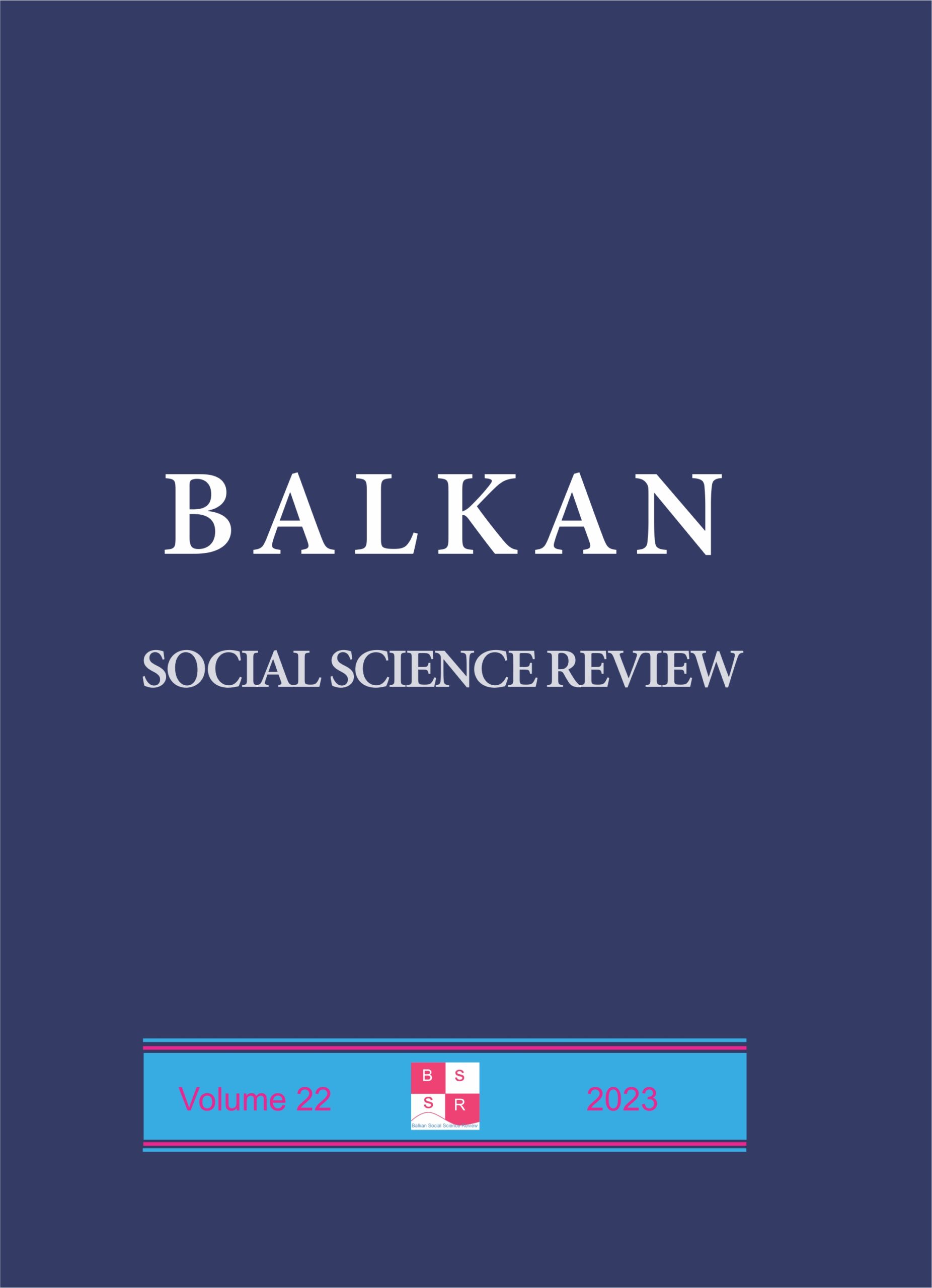
Understanding Social Realities of Internally Displaced Persons (IDPs) in the Federal Capital Territory of Nigeria (FCT), Abuja
Abstract:
This article examines the social realities of forcibly displaced persons in Nigeria, with a focus on internally displaced persons (IDPs) in the Federal Capital Territory (FCT) of Nigeria, Abuja. Internally displaced persons are individuals who have been forced from their homes or habitual places of residence and, unlike refugees, have not crossed the borders of their country. They remain under the primary protection of their governments and often seek refuge in their own countries. This study draws on secondary data sources and primary data collected from two IDPs campsites, arguing that most IDPs in the FCT, displaced by the Boko Haram insurgency live in makeshift and inhumane informal settlements in the peri-urban areas of Abuja City. These settlements also host the urban poor and other economic migrants in the country’s capital, occasionally leading to conflicts between them. The paper calls for the government to recognise the presence and condition of IDPs in the FCT and to work with relevant organisations to provide durable solutions to ensure that displaced persons can once again become productive members of society.
Cite this article:
BA-ANA-ITENEBE, C. A.; EDO, Z. O. (2023). Understanding Social Realities of Internally Displaced Persons (IDPs) in the Federal Capital Territory of Nigeria (FCT), Abuja. In: Balkan Social Science Review, Vol. 22, 213-231. https://doi.org/10.46763/BSSR232222213bai
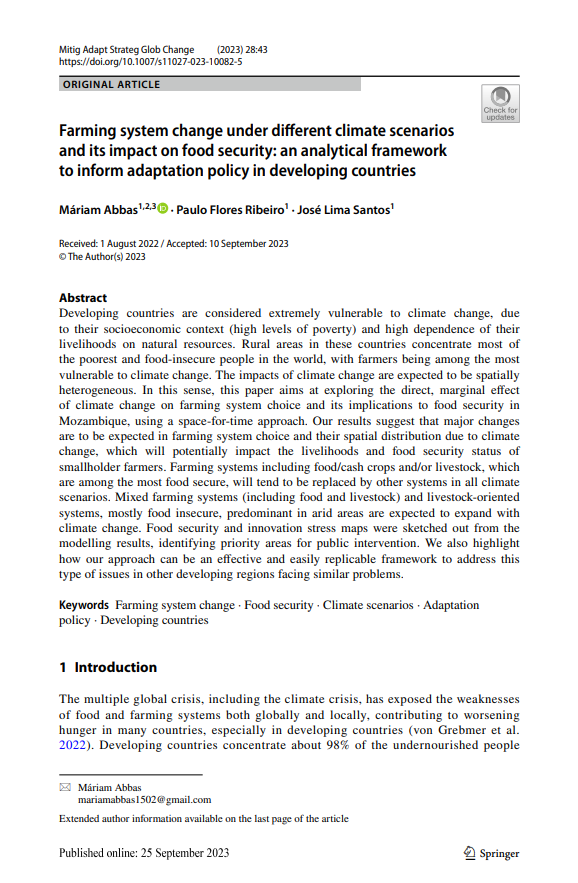
Farming System Change Under Different Climate Scenarios and its Impact on Food Security: an analytical framework to inform adaptation policy in developing countries
Abstract:
Developing countries are considered extremely vulnerable to climate change, due to their socioeconomic context (high levels of poverty) and high dependence of their livelihoods on natural resources. Rural areas in these countries concentrate most of the poorest and food-insecure people in the world, with farmers being among the most vulnerable to climate change. The impacts of climate change are expected to be spatially heterogeneous. In this sense, this paper aims at exploring the direct, marginal effect of climate change on farming system choice and its implications to food security in Mozambique, using a space-for-time approach. Our results suggest that major changes are to be expected in farming system choice and their spatial distribution due to climate change, which will potentially impact the livelihoods and food security status of smallholder farmers. Farming systems including food/cash crops and/or livestock, which are among the most food secure, will tend to be replaced by other systems in all climate scenarios. Mixed farming systems (including food and livestock) and livestock-oriented systems, mostly food insecure, predominant in arid areas are expected to expand with climate change. Food security and innovation stress maps were sketched out from the modelling results, identifying priority areas for public intervention. We also highlight how our approach can be an effective and easily replicable framework to address this type of issues in other developing regions facing similar problems.
Quotation:
Abbas, M., Ribeiro, P.F. & Santos, J.L. Farming System Change Under Different Climate Scenarios and its Impact on Food Security: an analytical framework to inform adaptation policy in developing countries. Mitig Adapt Strateg Glob Change 28, 43 (2023). https://doi.org/10.1007/s11027-023-10082-5
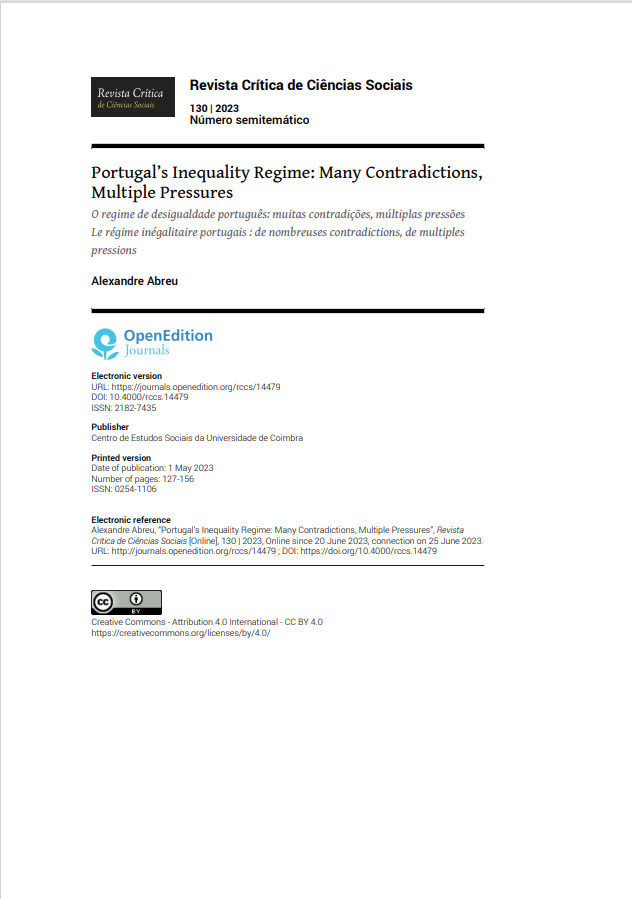
Portugal’s Inequality Regime: Many contradictions, multiple pressures
Abstract:
This paper applies the concept of inequality regime, in the tradition of the Regulation School, to the analysis of the patterns and drivers of socioeconomic inequality in Portugal in the last few decades. Key empirical patterns are identified with respect to income inequality, top and bottom incomes, wealth inequality, monetary poverty and non-commodified provision of basic goods. We then discuss several underlying processes and mechanisms, namely the capital-labour relation, classification struggles, financialisation, redistribution, and welfare, to account for the identified empirical patterns. We conclude that Portugal’s inequality regime is remarkably contradictory and argue that the country’s success in curbing most measures of inequality in recent times is especially vulnerable to a variety of pressures.
Quotation:
Abreu, A. (2023). “Portugal’s Inequality Regime: Many contradictions, multiple pressures”. Revista Crítica de Ciências Sociais, 130:127-156
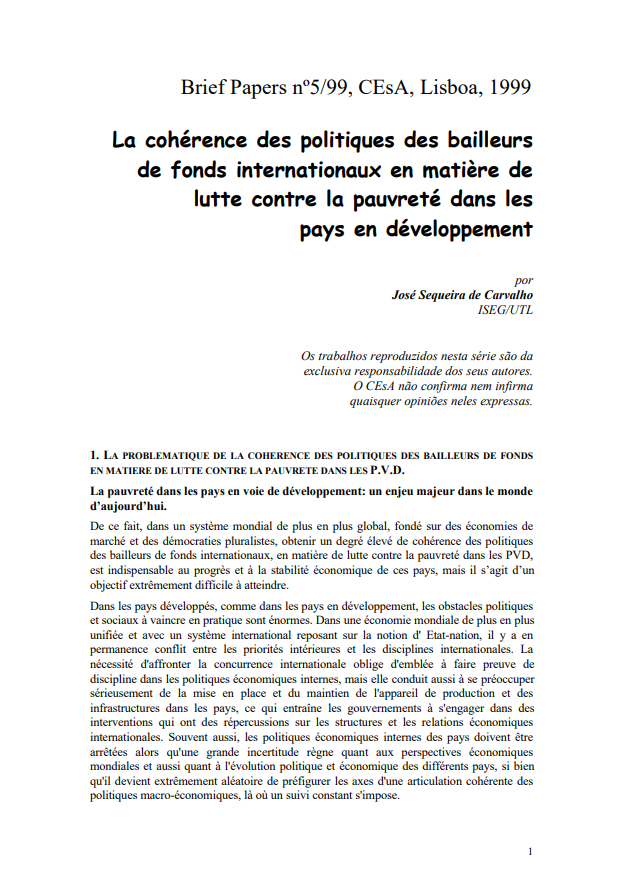
Brief Paper 5/1999: La Cohérence des Politiques des Bailleurs de Fonds Internationaux en Matière de Lutte Contre la Pauvreté dans les Pays en Développement
Abstract:
Poverty in developing countries is a major challenge in today’s world. In La cohérence des politiques des bailleurs de fonds internationaux en matière de lutte contre la pauvreté dans les pays en développement, we explore how in an increasingly global system based on market economies and pluralistic democracies, achieving a high degree of policy coherence among international donors in the fight against poverty in developing countries is essential for the progress and economic stability of these countries, but is an extremely difficult objective to achieve. In both developed and developing countries, the political and social obstacles to be overcome in practice are enormous. In an increasingly unified global economy and with an international system based on the nation-state, there is a constant conflict between domestic priorities and international disciplines. The need to compete internationally requires discipline in domestic economic policies from the outset, but also leads to serious concerns about building and maintaining the productive apparatus and infrastructure within countries, which leads governments to engage in actions that affect international economic structures and relations. In many cases, domestic economic policies have to be decided in the face of great uncertainty about the global economic outlook and political and economic developments in individual countries, making it extremely difficult to predict the direction of coherent macroeconomic policies, where constant monitoring is required.
Quotation:
Carvalho, José Sequeira de. 1999. “La cohérence des politiques des bailleurs de fonds internationaux en matière de lutte contre la pauvreté dans les pays en développement”. Instituto Superior de Economia e Gestão – CEsA Brief papers nº 5-1999.
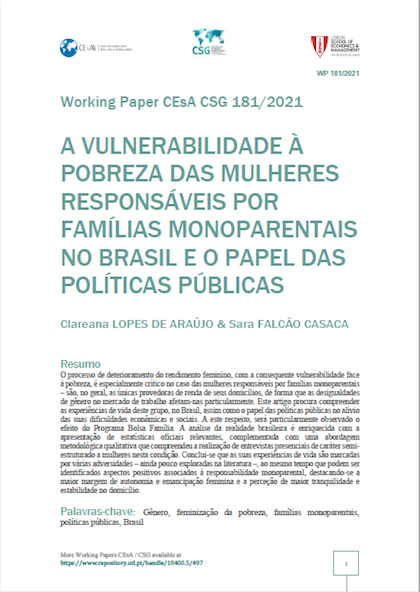
Working Paper 181/2021: A Vulnerabilidade à Pobreza das Mulheres Responsáveis por Famílias Monoparentais no Brasil e o Papel das Políticas Públicas
Abstract:
The deterioration of women’s income, and their consequent vulnerability to poverty, is particularly critical in the case of women who are the head of single-parent families – being them the only provider to the household, gender inequalities in the labor market affect them more significantly. A Vulnerabilidade à Pobreza das Mulheres Responsáveis por Famílias Monoparentais no Brasil e o Papel das Políticas Públicas seeks to understand the life experiences of these women, in Brazil, as well as the role of the State in alleviating their economic and social difficulties, where the effect of the Bolsa Família Programme will be studied in particular. The analysis of the Brazilian reality is enhanced by the presentation of relevant official statistics, complemented by a qualitative methodological approach based on semi-structured interviews conducted with women in this situation. It is concluded that their life experiences are affected by several hardships that are still relatively under-researched, but also by positive aspects related to their condition as single parents, above all in terms of their autonomy and perception of greater emancipation, as well as living in a safe and emotionaly stable environment.
Quotation:
Araújo, Clareana Lopes de e Sara Falcão Casaca (2021). “A vulnerabilidade à pobreza das mulheres responsáveis por famílias monoparentais no Brasil e o papel das políticas públicas”. Instituto Superior de Economia e Gestão – CEsA/ CSG – Documentos de Trabalho nº 181/2021.
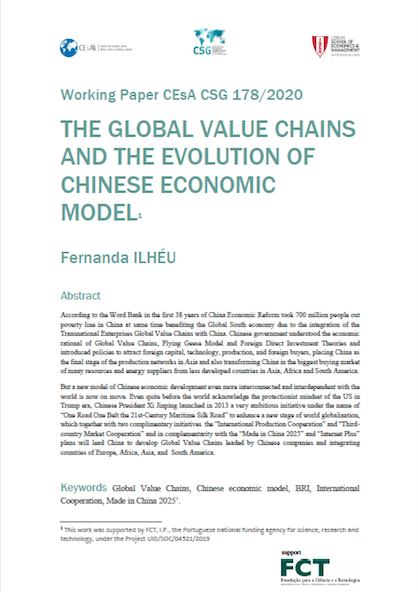
Working Paper 178/2020: The Global Value Chains and the Evolution of Chinese Economic Model
Abstract:
According to the Word Bank in the first 38 years of China Economic Reform took 700 million people out poverty line in China at same time benefiting the Global South economy due to the integration of the Transnational Enterprises Global Value Chains with China. Chinese government understood the economic rational of Global Value Chains, Flying Geese Model and Foreign Direct Investment Theories and introduced policies to attract foreign capital, technology, production, and foreign buyers, placing China as the final stage of the production networks in Asia and also transforming China in the biggest buying market of many resources and energy suppliers from less developed countries in Asia, Africa and South America. But a new model of Chinese economic development even more interconnected and interdependent with the world is now on move. Even quite before the world acknowledge the protectionist mindset of the US in Trump era, Chinese President Xi Jinping launched in 2013 a very ambitious initiative under the name of “One Road One Belt the 21st-Century Maritime Silk Road” to enhance a new stage of world globalization, which together with two complimentary initiatives the “International Production Cooperation” and “Third-country Market Cooperation” and in complementarity with the “Made in China 2025” and “Internet Plus” plans will lead China to develop Global Value Chains leaded by Chinese companies and integrating countries of Europe, Africa, Asia, and South America, studied in The Global Value Chains and the Evolution of Chinese Economic Model.
Quotation:
Ilhéu, Fernanda (2020). “The global value chains and the evolution of chinese economic model”. Instituto Superior de Economia e Gestão – CEsA/ CSG Documentos de Trabalho nº 178/2020.





